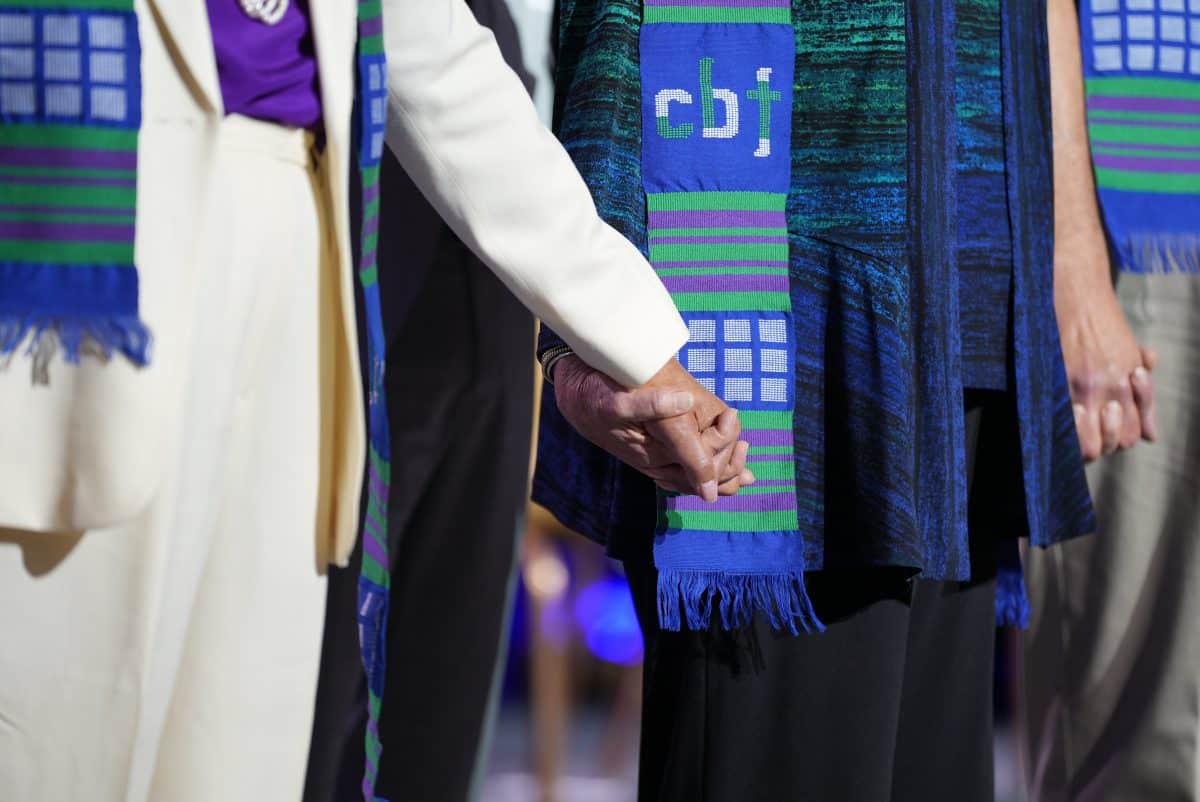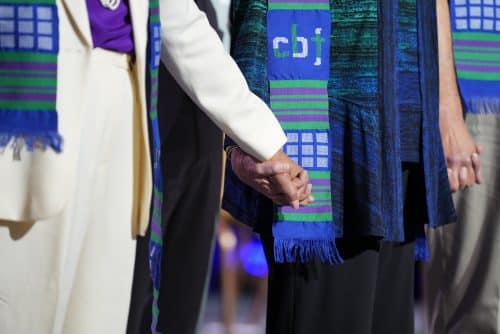
I have been asked by Word&Way to offer some reflections on what I observed at the annual Cooperative Baptist Fellowship (CBF) General Assembly (GA), which took place in my hometown of Atlanta the week of June 26. My participation at the GA was limited, but I saw and heard enough to offer the following provisional reflections.

David P. Gushee
I begin with some personal history. I came over to CBF world fairly late — in 2007. That was when I joined the faculty at Mercer University and also when I joined the CBF-affiliated First Baptist Church of Decatur. This left me playing catchup when I began encountering what some of us now affectionately call “CBF World,” and even after 16 years I do not claim to understand it the way that CBF lifers do. I welcome revisions, corrections, and emendations!
My first exposure to CBF institutions, including most CBF-affiliated congregations, left me with the impression that while the CBF was definitely different from the Southern Baptist Convention (SBC) from which it had so painfully split. But it also appeared to me that many CBF institutions seemed largely unwilling to express, in writing, especially clear and distinctive theological, ecclesiological, or ethical convictions — other than support for women in ministry, a primal cause of the split from the SBC.
Observers suggested to me at the time that CBF was unwilling to differentiate itself more clearly from the SBC in part because some of its constituency was still essentially Southern Baptist in its way of thinking about things. This was powerfully symbolized and instantiated by the awkward fact that many CBF-affiliated congregations also remained affiliated with the SBC. This struck me as marking an incomplete rupture between the SBC and the CBF. While the CBF leadership cadre was long gone (or banned) from the SBC, at the grassroots level the split was by no means complete. It was kind of like a marital divorce in which the couple still lives under the same roof.
I also wondered whether a reflexive trauma-based fear of being attacked as liberal from the right made at least some CBF officials hesitant to position CBF institutions in ways that would make them further vulnerable to right-wing attacks. When one has been (quite unfairly) pilloried as liberal/heretical by the right-wing attack machine, it only makes sense that one might spend decades in something of a defensive crouch. I know that trauma, that fear, and that defensiveness, as I have experienced it myself.
As the years wore on, and the divisions in American society and religion intensified, CBF’s middle-of-the-road posture struck me as anachronistic and unlikely to succeed. I remember when a friend of mine said to me that “in Texas, the only things you find in the middle of the road are yellow lines and dead armadillos.” I feared that CBF would be a casualty of its own caution, joining dead armadillos and yellow lines in the middle of the road.
Turning to the CBF General Assembly in Atlanta last week, the events I witnessed lead me to believe that CBF and its related institutions are more clearly differentiating themselves than I have ever seen before. Of course, part of it has to do with the extraordinarily hard-right-wing turn of the SBC.

Friday worship during the 2023 CBF General Assembly / courtesy of Cooperative Baptist Fellowship
At a time when a (severely diminished) SBC is yet again tightening the screws to keep women out of pastoral leadership, at the CBF GA, the massive support for Baptist Women in Ministry and the unquestioned leadership offered by scores of female pastors and scholars told a very different story.
At a time when the SBC’s public policy presence is overwhelmingly right-wing, and when former SBC Ethics and Religious Liberty leader Russell Moore has been pushed out of his office and the denomination mainly for being insufficiently Trumpian, the kind of leadership offered by the Baptist Joint Committee (BJC) and its Executive Director Amanda Tyler could hardly be more distinctive.
At a time when the all-white-male SBC seminary presidents have felt it necessary to join the hysterical right in beating the dead horse of a caricatured “critical race theory,” Baptist News Global featured leading Black scholar Dr. Jemar Tisby as its featured speaker; CBF’s Dr. Emmanuel McCall Racial Justice Trailblazer lunch featured pastor-scholar-activist and new McAfee preaching professor Dr. Otis Moss III; the BJC featured Black scholar Dr. Adam Bond as its keynoter, and the latter announced the acquisition of the Center for Faith, Justice, and Reconciliation, which focuses on racial justice and reconciliation and is led by a Black female scholar named Dr. Sabrina Dent.
The speeches at these events were filled with honest reckoning with the history of white supremacism and uncompromising commitment to genuine racial justice. And they were offered by Black leaders themselves. This is notable.
This was the year in which nothing that happened at the SBC annual convention, and nothing that happened at the CBF General Assembly, could possibly have happened at each other’s meeting.
This certainly seemed to be a year in which CBF World made its path clear. It is heading toward a just and inclusive Christian vision, a Jesus-centered progressive Christianity. It is rejecting the path of the MAGA/mega-Christian Right.
This may explain why I have never felt more at home at a CBF gathering than I did last week.
David P. Gushee is distinguished university professor of Christian ethics at Mercer University and chair of Christian social ethics at Vrije Universiteit (“Free University”) Amsterdam/IBTS. He also serves on the Board of Trustees at Word&Way and is the author of several books, including Defending Democracy From Its Christian Enemies which comes out later this year and is available for preorder now.






